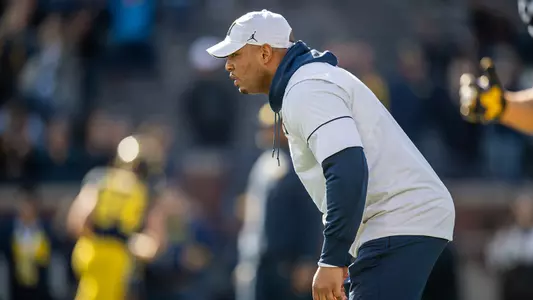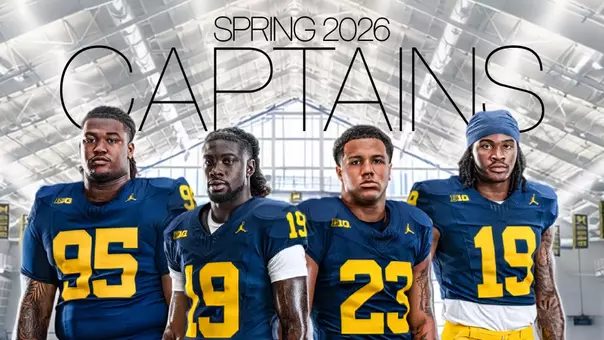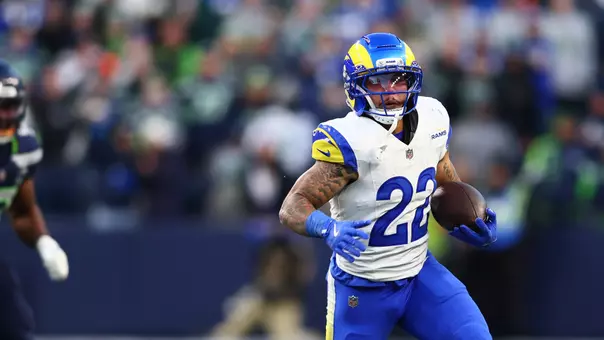
How Gattis Went from Playing Defense to Coaching Offense, His Challenges at Michigan
9/12/2019 10:45:00 AM | Football, Features
By Steve Kornacki
ANN ARBOR, Mich. -- The man who was all about defense as a player has been all about offense as a coach.
Josh Gattis was a two-time All-Atlantic Coast Conference safety at Wake Forest and went on to play in the NFL on defense. But when his first opportunity to become a coach presented itself, it was as an offensive graduate assistant coach under Butch Davis at North Carolina.
Then he became the wide receivers coach at Western Michigan before getting that same position group at Vanderbilt under current Penn State coach James Franklin, who took him to State College while adding the title of passing game coordinator. Gattis was the co-offensive coordinator last year at Alabama, teaming with new Maryland head coach Mike Locksley, and learning from coaching legend Nick Saban.

It's been offense, offense and more offense for the last decade, and he credits current Mississippi State coach Joe Moorhead, whom he worked with at Penn State, as his biggest influence. But there's also plenty that has come into play for Gattis from his years as a defensive back.
"My first dream was to be a very successful defensive coordinator," said Gattis. "But my first job opportunity came on the offensive side of the ball at North Carolina. I told myself, 'I'll learn offensive schemes. I'll learn protections. I'll learn the run game, and be a better defensive coordinator.'
"Little did I know I was going to fall in love with the offensive side of the ball. My advantage there early in my coaching career was understanding defense. That's where I was able to bring the most immediate value. I told my receivers, 'Look at the technique this defensive back is playing, and how do you beat that technique?' That led to a lot of early success while I still was going through the growing process (on offense)."
He grew up in Durham, North Carolina, the youngest of three children, with parents, Joe and Joyce, who set great examples for work ethic. Josh said his mother raised them as a "single parent" but his father had a strong influence on him, too.
"I get all my strength and courage from my mom -- as well as her passion and attitude," said Gattis. "She still watches every game, and is so strong and so self-driven. She'll come to games as well, and she texts me after every game."
He grew up across the street from the park where he began playing football at 7, and also played basketball and ran track. Josh was a natural athlete with a strong will to win, and ended up at Wake Forest, where he blossomed and made five interceptions as both a junior and senior, returning two for touchdowns and combining for 154 tackles in those two seasons.
Gattis was on the Jim Thorpe Award watch list in 2006, when he was a senior and helped lead Wake Forest to its only ACC championship since 1970 and an Orange Bowl berth. The Jacksonville Jaguars drafted him in the fifth round and he played briefly for the Chicago Bears in 2008 before turning to coaching.
When University of Michigan head coach Jim Harbaugh offered the opportunity to be his offensive coordinator, Gattis couldn't come aboard fast enough.
"This is what I've wanted my whole life -- the opportunity to run my own offense and be an offensive coordinator," said Gattis. "So, every day I come to work, it's the best feeling in the world being able to go out there and lead these young men and put them in a position to be successful."
He said calling the plays in scrimmages rather than going with a script offense is accelerating his feel for doing this job.
"What makes it so easy in games is that I'm so used to calling plays in practice," said Gattis. "That was a big point for (Harbaugh), 'You've never called plays before and so let's get you caught up.' I can't tell you how much I've learned from doing that. That's huge, just huge.
"Today, we were going to have a scripted seven-on-seven, but he said, 'Call it!' You go into those scenarios and it puts you in the positions you'll be in during games."
What does Gattis know now -- after two games -- that he didn't before them?
"The thing that I didn't know is the pressure you put back on yourself after every game," said Gattis. "I can't shut my brain off at night. I watch the game probably five or six times when I get home. You go through every call and hang your head on the plays that don't go as well. I didn't know how much stress was involved in that, and I have to do a better job of not putting that pressure on myself.
"When you fumble on the play, it can't be the end-all, be-all. You have to handle success and handle when things don't go well. I was frustrated after the first half (of the Army game), but I never let kids see that frustration. You can't let it trickle down or they won't play confident. So, after the game, it was a time to build them up. These kids put so much pressure on themselves; they want to be great."

The Challenges for Gattis and His Offensive Unit
Gattis has had eight months to convert Michigan from a pro-style to a spread offense that doesn't huddle and operates with read-pass options.
It's a big transition, and it's ongoing. The Wolverines have won 40-21 against Middle Tennessee State and 24-21 in double-overtime over Army, and the output has been good enough to win. There have been highs and lows, zero interceptions and too many lost fumbles (five) -- good things and not so good things.
Gattis was asked about Mom's message after surviving Army.
"She said, 'Good win, you've got to take every win,' but I didn't want to hear that. I was a little frustrated, but she's a supportive mom. The questions about the play-calling came from my wife (Tesa)."
Gattis laughed about that, but is quite serious about improving his offense. Still, he likes what he has and the spirit of his players, and is confident that the desired consistency is coming.
"Ultimately, it's my job to put them in positions to be successful," said Gattis, "and I'm very hard on myself from that standpoint. There's always a couple calls from every game where you wish you could go back and look at them. 'You should've done this differently. You should've done that differently.' But you can't always live in the past. You've just have to learn from those and move forward.
"We feel good about the game plan we had both games, and how we executed. There were times when we didn't execute and we just have to go back and correct the mistakes, and get the little things out of the way. We've got to eliminate some mistakes on our end, but our kids battled. We'll get it cleaned up."


Peoples-Jones (left) and Runyan have yet to play in 2019, but the players that have filled in for them have been solid in their absence
Michigan has yet to have All-Big Ten first team offensive tackle Jon Runyan, or starting wide receiver Donovan Peoples-Jones in action, but both could return as soon as Sept. 21 at Wisconsin. And while those taking their places have stepped up with solid play, the Wolverines can't help but be better with them.
Gattis also coaches the receivers just as he's done at every other stop. He had Alabama's Jerry Jeudy, who won the Biletnikoff Award last season as a sophomore, and Crimson Tide freshman Jaylen Waddle was a Pro Football Focus first team All-American. Gattis also coached All-American receivers in Vanderbilt's Jordan Matthews and Western Michigan's Jordan White. DaeSean Hamilton and Chris Godwin were All-Big Ten selections who made it to the NFL along with Matthews and White.
What sets great receivers apart from the rest?
"It comes down to details, the technique," said Gattis. "It all starts with having a plan. A lot of times, what goes into that is pregame film study, understanding how a defensive back plays. When does he tip you off with his hips? What technique does he press with? You gain that knowledge so that when we call this play, you're thinking about how you're going to set this guy up. Then it's a matter of being ready to execute."
Gattis admits improvements are required there for the Wolverines.
"We've just got to get our timing down in every phase and every aspect of our operation on offense," said Gattis. "We've got to eliminate the mistakes that hurt us (he noted 10 penalties, dropped and overthrown passes). I think our kids are just pressing. They want to be great. There's a high standard for them and a lot of pressure. I think right now is a perfect opportunity to get them calmed down. 'Hey, let's just play loose. Let's play our type of football.' We'll spend the bye week and hopefully get some voodoo expert in here to get rid of the curse of the fumbles.
"But we put a ton of work into our ball security. We do ball-security drills every day in practice. If it was an issue that showed up in practice, it would be alarming that it carries over to games. But it's been totally uncommon. If they fumble in practice, they run just as much as if they get a penalty. They run three laps right away and we do it from a disciplinary standpoint to make sure we're playing as much disciplined football as possible. I think they also understand the severity. No one wants to fumble. They're embarrassed, hurt. They want to be great. I have no doubt in my mind we'll clean it up, they'll clean it up."

Wisconsin's Camp Randall Stadium, where the No. 10 Wolverines play next, isn't an easy place for opponents. But might getting away from Michigan Stadium, where Gattis noted "excitement" being part of what his players are dealing with, help calm them?
"I think so," said Gattis. "I hope so. I definitely hope so."
He's going to work on putting the focus on their assignment competency and execution, and knows good things will happen when the pressing ceases.
"We just need to do what we do and eliminate errors," said Gattis. "If we do that, the sky's the limit for us. We've shown that at times, but we just haven't shown it enough consistently."
There's plenty to digest in running a new offense, and that goes for understanding what the various large signs held up on the sideline mean in terms of the next play. There are signs with a lightning bolt, crayons, yoga pants and more.
When asked to, without giving away any secrets, explain the basics of those signs, Gattis said, "Those are very important pieces to our offense. They give information to everyone, and that's about as much as I can give you on that (laughter). We can't run a play without those."
What Michigan is running now is based on what he learned from Moorhead, but includes some Tuscaloosa touches.
"It's now a mix of a pro spread," said Gattis, "which I was able to gain a lot of insight into in the pro-style run game and pro-style passing game last year at Alabama. But we look at the base spread principles and what I learned in quarterback reads and stuff, and that all came from Joe Moorhead. He's a tremendous friend of mine who's been a mentor.
"But I've learned from every coach I've worked for from Butch Davis to Bill Cubit (at Western Michigan) to James Franklin, who I spent six years with. I have tremendous respect for him as well, and those guys have impacted me from a coach standpoint and offensive standpoint."
Harbaugh said he's learned much from Gattis while he revamped the offense.
"Jim Harbaugh has impacted me tremendously with his leadership and amount of support for me," said Gattis. "He's grown me as a coach, and in the little time I've been here, he's put me through so many different situations at practice which really helped my growth."
Keep in mind that, while the play-calling hasn't been perfect, it never is. And the lack of execution is really what's kept the offense from being consistent. But Gattis has learned from what's gone wrong and what's gone right, and can't wait for the next challenge.












